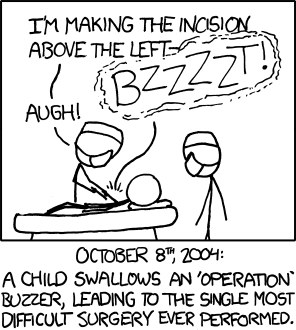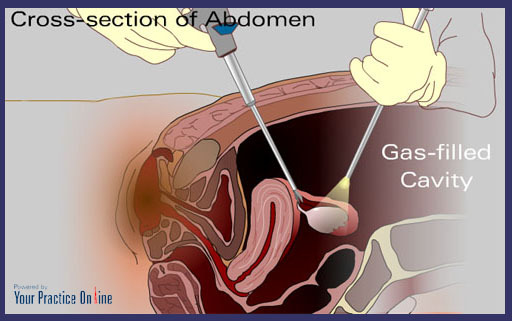 |
| Comic thanks to xkcd |
1) Have a pain/symptom diary and know what the symptoms of endometriosis are.
When I visited the
Canberra Endometriosis Centre (a centre that I highly recommend if you are in the ACT area) after my diagnosis I had a meeting with one of the nurses there. She listed off a number of symptoms and asked me if I had them and to what degree they affected me. Some of the list I had always thought were normal before - like constipation or diarrhoea with your period, pain with bowel movements and painful urination, as I had had them for as long as I could remember and so never thought any different. (And when you do ever talk about these things with anyone? For all I knew, they were normal!) After she pointed them out to me (and this could be seen as a bad thing, I guess), I noticed just how often I experienced these symptoms.
It's important that your doctor knows all of your symptoms and how often you experience them, so they can judge whether it might be endometriosis or something else, like irritable bowel syndrome. I often found that when I was not in pain it was easy to forget how bad it was and I ended up playing down the severity of it to the doctor. It's important to record your pain while you are having it so that the doctor gets the full picture.
Pain/symptom diaries can also be handy when trying to plan your life around when you are likely to get pain. If your pain was fairly predictable like mine (most months it was the 7 days before my period, and the first few days of my period, as well as a day or so for ovulation), you can then plan to take it easier and get more rest during that time by scheduling less activities.
Pain/symptom diaries are also useful when trying different treatments to see if the treatment is actually having an effect.
Useful things to include in a daily pain/symptom diary include:
- intensity of the pain on a 1-10 scale. (this is hard at first because it is very subjective but at the same time it is useful for communicating differences between different pains to your doctors)
- location of the pain
- type of pain (eg dull ache, pulling, tugging, sharp twinge, tenderness, throbbing, contraction-like)
- any time dependence of the symptoms (eg worse in morning, better in evening)
- triggers (eg overdoing it, stress, drinking coffee, spicy food, forgetting to take supplements, not doing enough exercise)
- remedies and whether they were effective (eg hot water bottle, exercise, different medicines)
To keep record of your pain you can use a chart or app. I use
My Pain Diary Lite from the App Store. (There is also a paid version for $5, but I find the free version works just fine.)
2) Be aware of your options.
Read as much as possible about endometriosis and pelvic pain itself and the treatment options out there. One of the problems with getting treatment for endometriosis is that many doctors aren't aware of the less invasive methods that can be tried first before the more extreme surgery option. Some people can manage their endometriosis using hormonal methods (such as the Pill, Mirena or Implanon) or through diet, supplements and exercise, and surgery is not needed, so it is important to explore these pathways first.
When it comes to surgery, excisional surgery is the "gold star" treatment. Not all surgeons do this surgery so find a surgeon in your area who does it, or consider going elsewhere for surgery.
Other treatments for pelvic pain include acupuncture, yoga, and pelvic flood physiotherapy to relax the muscles. A holistic view to health including treating associated depression and anxiety may also improve pain.
There are many resources for learning about different treatments out there. There are a number of different blogs like the ones listed in
this post or books like Susan Evans'
Endometriosis and Pelvic Pain (free e-booklet available, but the book is also well worth the money). Check 'em out!
3) Don't be afraid to push for treatment.
I only got diagnosed and treated for endometriosis because I went to my GP and told her to give me a referral to a gynaecologist I had heard was good. Once I went to that gynaecologist he basically left it up to me whether I wanted to have the surgery or not (not that he gave me another option for treatment other than having a baby, I can't say he was the best gynaecologist after all).
Before this, I had a few different doctors who tried a few different things. I had one doctor that did a pelvic ultrasound and when that came back clear, he sent me on my way. Do not accept this. Endometriosis can
never be ruled out by ultrasound. I have stage III endometriosis and it didn't show anything. Another doctor I had put me on the Pill for pain, but it didn't work and just gave me worse symptoms than before.
What I'm trying to say is, if one doctor will not help you, keep going, try other doctors. Ask friends for recommendations. Search the internet for endometriosis specialists in your area, and read the reviews. Of course, internet reviews should always be taken with a grain of salt, but generally, if your doctor is getting averages of 2.5 stars, then you're probably not going to have as good an experience as you would with a doctor who averages 5 stars.
I had to be persistent and brave the setbacks. The sad fact is that you probably will have to too, but just know that if you persist, you may get answers and things might just get better.
I'm still having to do this now, even after diagnosis. When I told my doctor that I have bladder pain she tested me for a UTI, and when that came back negative, she didn't keep investigating. I've brought it up again at subsequent appointments and she has referred me to another doctor to keep investigating.
4) Have realistic expectations.
If you have pelvic pain, it may not be completely fixed by whatever method of treatment your doctor uses. I think that if the doctor had told me that surgery didn't always work, I may have had an easier time recovering mentally from the diagnosis and the operation. It's important to know that you may actually have to live with at least some pain for the rest of your life. Hopefully not, but at least this way you are not let down.
5) Have a plan of what you want to discuss with your doctor.
This should probably be number one on the list - you generally only have 15 minutes that you may have to wait a few months for, so make it worth your money and time! I generally make a list of my concerns and take it with me to the appointment - I also have a folder dedicated to all of my health related paperwork. Rehearse your first few sentences if you need to, just so your doctor knows exactly what you are concerned about and why you have come to see them. Doctors see a lot of patients and you want them to do the best job possible for you, so help them out a bit and make it clear what your concerns are.
I know for me, this tip has made my life much easier - lately I've been going to at least one appointment a week, more often two, so it's important that it's worth the time I take out of my work day.
6) Know that you are the one in control.
No doctor should force you to try any treatment you are not comfortable with. It is your body and you are the one that will have to deal with any repercussions, not the doctor. Also, you need to be the one to be active and involved in your health - a doctor can talk to you all day about how you should do this or that, but in the end, you need to be the one that makes productive steps to improve your health.
For more tips go to this post in
Mind Your Body - a blog focussed on managing the mental health of chronically ill patients by two psychologists in the US. Just shows that there are some really great doctors out there - don't give up hope!
Also stay tuned - later this month there will be a post with tips for health care professionals and caregivers for dealing with people with endometriosis.
_________________________________________________________________________________
This month I will be taking part in National Health Blog Post Month. Check back every day to see the new topic and learn more about endometriosis. This post is just me taking liberties and writing about what I felt like writing about today (seeing as I had two appointments scheduled today).




































